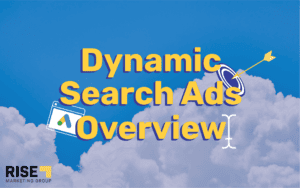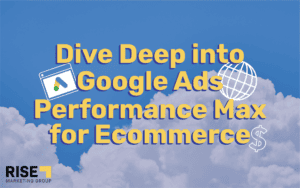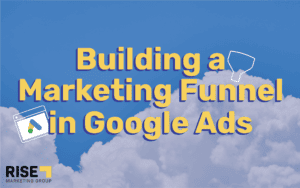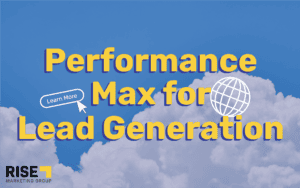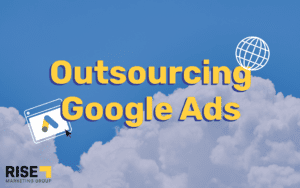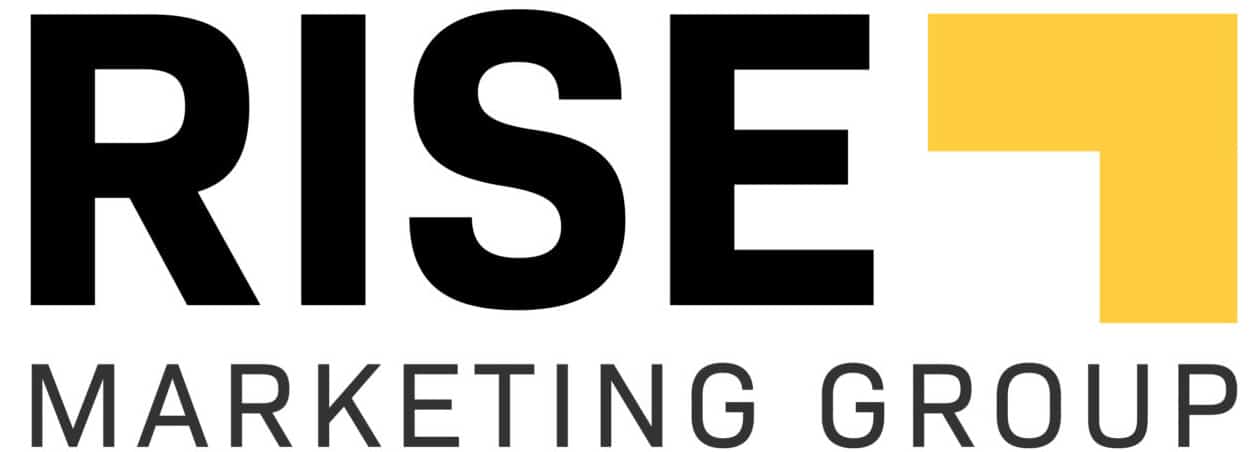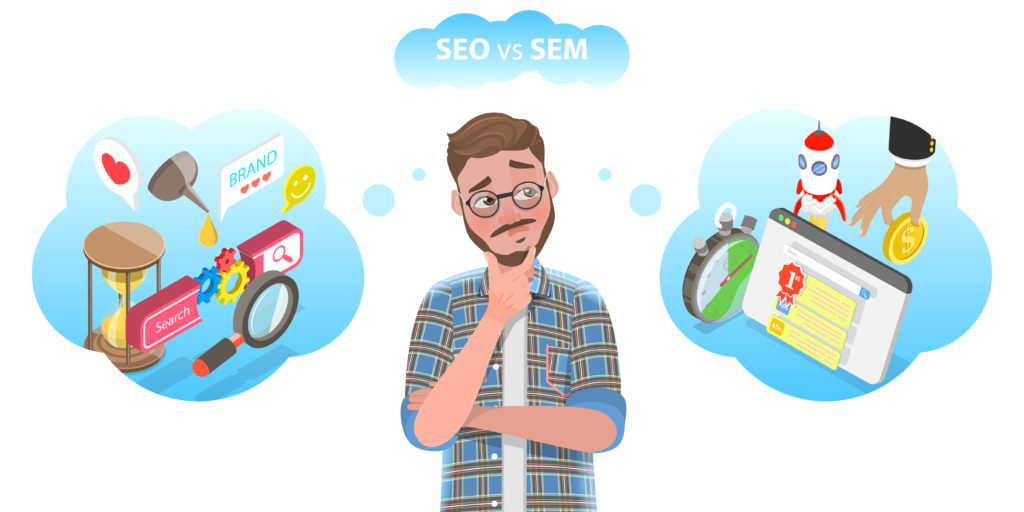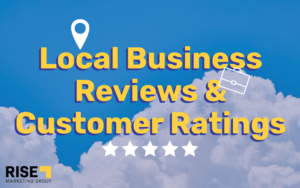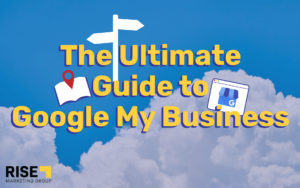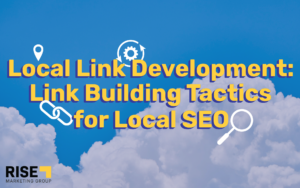SEO or PPC / Search Ads – Video
Full video transcript at the bottom of the blog post
Google Search Ads
Google Ads allow businesses to display ads on Google’s search engine results page, YouTube, and display networks. They reach potential customers who have expressed some sort of interest relating to your company’s products or services.
One important factor to note about advertising on Google is that users tend to use it in search of an answer. A search campaign is designed to advertise towards people whose questions your business can answer. In other words, your business’s products or services solve their question or problem.
Let’s take a look at the biggest pros and cons for Google Search Ads:
Pros
- Websites get immediate traffic upon flipping a switch.
- Traffic to your website is high intent, you can hone in on the EXACT keywords that are most valuable to your business.
- With appropriate conversion tracking, advertisers can get immediate feedback on which keywords are driving profitable business outcomes.
Cons
- While the traffic should more than pay for itself, it will be an ongoing payment to Google. However, I purposely didn’t list this as an “expense” given this is a profit-generating tool.
SEO
Did you know a majority of people click on results on the first page of a Google search? According to a study from Moz, that number can be as high as 75%.
SEO’s main goal in its simplest form is to rank higher on Google for this exact reason. Because of this, your online presence is essential to the success of your online sales.
In addition to ranking higher on Google, SEO can heighten the overall user experience on your site. Each SEO best practice, including site speed, optimized images, and visually appealing content, is tailored around keeping users engaged with your platform.
Google’s search algorithm and ranking system try to put the most relevant content on the first page of a search based on ranking factors it deems most important. It takes notice of how many users view each landing page on your site, and how long they engage with it.
Let’s take a look at each of the biggest pros and cons for SEO:
Pros
- It’s free traffic!
- Over time the amount of free, organic, traffic will continue to grow and will have a snowball effect. Gains from the onset will be small, but over time they will grow.
Cons
- You need to be patient with SEO. Traffic can take 2-3 months to start to show some signs of progress.
SEO Offering
To fuel client growth, we now have an SEO practice up and running. Our approach consists of 3 pillars in driving organic growth, including:
- Technical audit. From the onset, we’ll crawl your website and provide recommendations to optimize the technical components to be as SEO friendly as possible.
- Content creation. Content is still king. Without quality and relevant content, that’s answering questions users are asking Google, it’s impossible to rank on Google. With that, we’ll optimize on-page content, and also write several blog posts per month, based on keyword research.
- Link Development. Google looks to see how many other websites are linking to your website when determining organic ranking. This is just one ranking signal, but it is a strong one. With that, we’ll analyze your backlink profile and develop links from other websites, linking to yours to boost your online authority.
- Monthly reporting. We’ll create a dashboard that will showcase your organic traffic and trends over time, to see how we’re evolving.
SEO or Google Search Ads: Where Does That Leave Our Clients?
We generally advise clients to start with paid search ads, to get some profitable traffic flowing to the website. Once search ads are proven and these efforts are paying for their expenses, then I would expand the program to focus on SEO.
To boot, if you begin with paid search ads to start, some solid synergies can be leveraged from paid search to fuel SEO.
Specifically:
- Meta descriptions. With Google Search Ads, you can quickly see which headlines and descriptions resonate with your audience. We can take this data and update meta descriptions to boost organic CTRs, which can influence organic traffic.
- Top keywords. Similarly, with Google Search Ads you can see which keywords are best for your business. Taking this data to inform SEO strategy can be highly beneficial, which will help us focus on the keywords that are high intent with sufficient volume.
If you’re interested in chatting SEO or Google Search Ads for your business, reach out and we’ll evaluate if now is an appropriate time to invest in organic search.
SEO or Search Ads / PPC video transcript
Invest in Search Ads, or, invest in SEO – which is gonna be best for your business?
Ben Lund, the founder of Rise Marketing Group, discusses his career and the ongoing debate on Search Ads or SEO.
The debate has not ended and continues to go, and the reason for that is search ads and SEO both work well and can both be profitable for a business. There are considerations to factor in when determining–should you invest in paying for that traffic through search ads, or, do you invest in search engine optimization to get organic free traffic?
Search ads are search ads–advertisements that you see on Google, Microsoft Bing, AOL Yahoo, and other secondary, tertiary search engines like DuckDuckGo. Where you can reach people at the exact moment of intent that they are searching for the product and services that you offer.
These types of ads do well, and that’s why Google is as big as they are because the foundation of its advertising has generally been search ads. Advertisers are willing to pay for them—for this because the return is there.
The benefits of search ads are the immediate traffic. This traffic is generally qualified because you’re only reaching people who are searching for the products and services that you offer. So with that, you’re gonna get some leads that are coming in. Another benefit, which is so incredibly helpful to know, is it can be a big-scale play for any type of business. Just by ramping up the budget on campaigns that are doing well, you’re gonna see more customers and leads coming through.
Those are all good, but the downside is, you’re paying Google and Microsoft, and the other search engines for every click that you’re paying for off of their search engines. Now, that’s not bad as long as the value per user coming from search ads is higher than what you’re paying Google. But you’re going to continue to leave an open checkbook or credit card and they’re gonna ding you every month or sometimes, every day, depending on how much on it you’re spending.
So, that’s a downside, and also it does take time. Sometimes you launch accounts and within the first month, you’re already profitable. Other times, it takes time to hone in on exact keywords, messaging, and landing page, to have it be profitable and truly ROI once you factor in all the ad costs that you’re putting out there.
Search ads, are good for any business that is a proven business, proven product, or service, you have a good website–it doesn’t have to be great but it has to be good because you’re paying for this traffic—and your website should have a unique selling proposition, potentially an offer, to get those visitors to convert–whether its a lead form, or transaction on your website.
It’s also great for businesses that are just looking for growth. You can take more customers and leads–search ads are great for that.
Let’s flip that on the other side of the coin, on the search coin, SEO.
So, SEO is Search Engine Optimization, and that is what you can do to have your website rank higher for people searching for you. The biggest benefit is you don’t pay a dime for this traffic, but you do pay for the time and effort required to put together really, truly, good, valuable content that earns the right to rank in Google’s eyes.
The benefit is its free traffic, and because it’s free, it can provide a really strong return on investment and return on time. But it does take time, which is the downside of SEO–it takes a ton of time, again, to earn the right to rank in Google’s eyes, or the other engines. You need to have a great website, it has to be fast, and you have to have unduplicated, quality content, and other websites linking to your content vouch for accreditation.
But, if you do it and you do it well, you’re going to–you’re gonna get a return. Now it’s not gonna be a return this month, or next month, but, it’ll be next quarter and the quarter beyond and the quarter beyond that, and it just like snowballs. Little gains early on, but then little gains increment on little gains continues to add up into a nice snowball effect.
SEO’s great for any business that is expecting to be around in 2-3 years. If you have a viable business, and you feel confident that you’re gonna be around in the next couple of years, invest into SEO, because it’s gonna take time to, like, really build it up. Not a couple of years, but this is one way to future-proof your business.
Now if you’re a startup, and you don’t even know where you’re gonna be in 6-9 months, do not bother with SEO because it takes too long to show a strong return, and you’re gonna start to see some gains probably after 3 months or so, but even those gains will be relatively light until this starts to build up.
If you have any questions on search ads management, SEO management, optimization, or more regarding this decision for your company, feel free to contact us.
Read more of our Google Ads Blog Posts and Best Practices
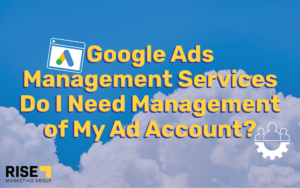
Google Ads Management Services – Do I Need Management of My Ad Account?
